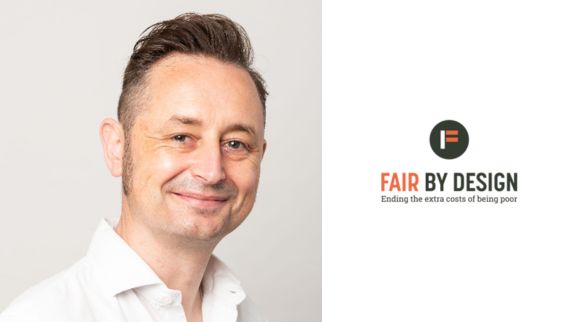
Fortnightly financial #42 Martin Coppack
Richard Freeston Clough, Communications and Stakeholder Business Partner, speaks to Fair by Design Director Martin Coppack about the importance of financial inclusion.
What is your current role and have you always worked in the consumer support area?
I am Director of Fair By Design and I have just been appointed as a Professor of Practice in Financial Inclusion and Consumer Policy at the Centre on Household Assets and Savings Management (CHASM) at the University of Birmingham.
Apart from teaching I‘ve always worked in the consumer movement in some way or another. We are increasingly told to look to the market for our needs, but the market works for the healthy and the wealthy, not for the poor and vulnerable. I see this a social justice issue. Take car insurance as just one example. You are charged extra depending on where you can afford to live, and you are charged extra if you can’t afford to pay upfront in one go.
The common thread to my work has been working with consumers to place their needs at the centre of decision making, especially around financial services and financial inclusion. For example, whilst at the Financial Conduct Authority I led the creation of its consumer vulnerability programme. This involved liaising with civil society and commissioning research which resulted in nationwide changes in how financial services companies treat consumers in vulnerable circumstances, as well as substantial changes in regulatory and social policy.
Fair by Design is committed to eliminating the poverty premium so that people on low incomes pay a fair price for essential services. Can you explain a bit more about what you mean by this?
Sure, in the UK more than 14 million people live in poverty. They pay more for life’s essentials such as energy, credit and insurance. They even pay more depending on how they pay for things. It really does cost more to be poor. Don’t just take my word for it. Listen to the real experts – those living with the poverty premium day in, day out here.
Our vision is for a UK where poor and low income people pay a fair price for essential services. We work with regulators, Government, Parliament and industry to eliminate the poverty premium. To realise this vision we develop practical policy proposals as well as encourage good practice. We research and advocate for change. What we do is rooted in lived experience.
Can you tell us a bit about some of the recent campaigns you have been involved in?
We have been working on quite a few different campaigns over the past years. Just to mention a couple of examples:
We are campaigning for the introduction of an energy social tariff. A social tariff is a targeted, discounted tariff. It should be designed to make sure everyone can afford enough energy to keep them safe and well. We want to see eligible low-income households automatically enrolled on such a tariff. We are working with a coalition of organisations on this. We’re also campaigning for the Warm Home Discount to be extended to those on disability benefits and for the amount of the benefit to be increased.
Another example is our campaign to end the extra costs that people pay for car insurance. People on low incomes pay higher premiums because of where they can afford to live, or because they need to pay for car insurance in instalments instead of all in one go. We are calling on the regulator to investigate how well the insurance market is meeting the needs of low-income consumers, including the premium charged to customers for paying monthly for their car insurance. We are also working with industry to design solutions.
These are just two examples, and if you want to find out more, you can visit our website or follow us on X and LinkedIn.
At FSCS we believe financial education is an important part of reducing harm suffered by consumers. What part does this play in the work that you do and what improvements would you like to see to financial education in the UK?
As an ex-teacher, and someone who helped create the Financial Services Authority’s first financial capability strategy, I think financial education is useful to a degree. However, it can only take you so far and it is often used as a reason for not making financial services meet the needs of people better. With the poverty premium, the issue is that products and services are designed in a way that costs more the poorer you are. It is baked into the product design process. You can spend ages shopping around only to find out that you are charged more or totally excluded because the market doesn’t want to serve you. You are viewed as either too high a risk or too costly to serve.
We campaign for essential services to be inclusive by design and have created toolkits for both firms and regulators. Take a look here.
And finally, on a more personal note, a question we ask most of our guests: if £10,000 landed in your lap tomorrow, what would you do with it?
Hmmmm… I’d probably share/donate some of it and go on a holiday with what’s left. Make some memories rather than buy more stuff!
Thanks for sharing your views with us, Martin.
The content of any discussions shouldn't be taken as an indication of future FSCS policy positions. The views expressed by guests are their own and don't reflect the views of FSCS.
-----------------------------------------------------------------------------------------------------------------------------------------------
Prof Martin Coppack is Director of Fair By Design and Professor of Practice in Financial Inclusion and Consumer Policy at the Centre on Household Assets and Savings Management (CHASM) at the University of Birmingham.
We would love everyone to dedicate a regular extra five minutes to check their financial products and services are FSCS protected.